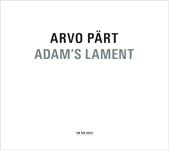|
|
 |
Dusted Reviews
Artist: Arvo Pärt Album: Adam’s Lament Label: ECM Review date: Nov. 30, 2012 |

|
|
|
 |
Writing about Arvo Pärt’s music can be an intimidating task. My knowledge of musical theory stops somewhere short of understanding just what tintinnabuli is or does, but there’s no lack of clarity in the effect that Te Deum had on me the first time I really listened to it. The chilling beauty and pathos that mark that 1984 composition can still elicit goosebumps from me if the mood is right, and I can’t quite say why. Though I’m not a churchgoing guy, I know that it’s partially due to Pärt’s penchant for the potency of sacred music and the anachronistic vein in which he works. Yet, there’s a subtle innovation at work, one that sets Pärt apart and is clearly effective, even if my conscious brain hasn’t yet gotten a handle on exactly what it is.
Though Adam’s Lament, Pärt’s newest collection, doesn’t hit me as hard as Te Deum, it’s still quite capable of drawing me in. Like so much of the Estonian’s work, appreciation requires some measure of surrender. “Salve Regina” — composed for four choirs and string orchestra and performed by the Latvian Radio Choir and Sinfonietta Riga, respectively — might take some time to develop, but when the climax of the piece arrives, it’s clear that it would be far less effective without the slow rotation that came before. “Adam’s Lament” begins with an almost immediate swell, then stays relatively (and somberly) peaceful for 16 minutes. The Sinfonietta Riga’s massed strings come in darkly as the piece nears its final third, then the violins begin to circle like dervishes around the strikingly strident chorus. The music’s arc is no less powerful for its predictability, but as with a soap opera, one must be following along for the big stuff to matter as much when it hits.
The shortest works on the album are a pair of lullabies performed by the Estonian Philharmonic Chamber Choir that clock in at just over two minutes apiece. Their pizzicato strings and condensed structure lend a quaint feel to the duo, which aren’t helped by their position at the end of the disc. Perhaps they’re too easy to digest, since “Alleluia-Tropus” packs more intrigue into a duration that’s only slightly more substantial. My disappointment with the lullabies lies in my desire to get lost in any Arvo Pärt composition that I come across. After all, his music is at its most powerful when the listener has been submerged in its thrall, seduced by what’s seemingly simple into something that borders on the ineffable.
By Adam Strohm
|







